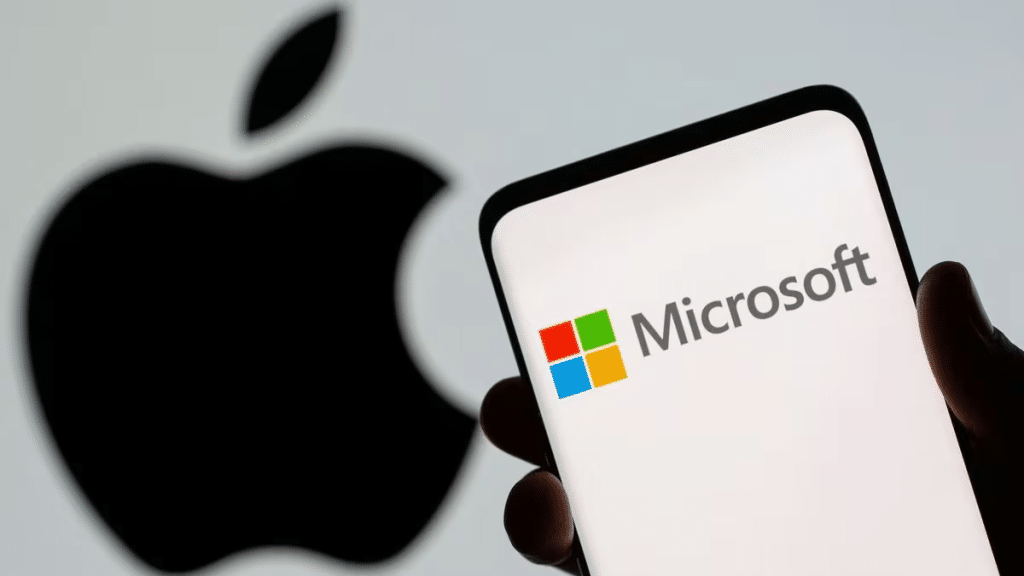While scrolling through https://essay-reviews.com/ for your next assignment, have you ever paused to think about the tech tools you rely on daily? In 2024, the tech scene has seen a surprising shift – Apple, once the epitome of innovation, seems to be trailing behind Microsoft. And this shift might seem unexpected.
Let’s ponder why Apple lags behind in the tech race against Microsoft.

The Innovation Drought at Apple
Remember when every Apple launch event used to feel like a peek into the future? Lately, those events have been more about minor upgrades rather than groundbreaking innovations. It’s like Apple’s playing it safe, refining existing products rather than introducing the next big thing. This cautious approach might keep current users happy, but it fails to attract the awe and excitement that once defined Apple’s launches.
This stagnation in innovation contrasts sharply with the daring leaps that once propelled Apple to the forefront of tech. The world still remembers the launch of the iPhone and how it changed mobile technology.
However, recent years have seen a lack of such revolutionary products. It’s as if Apple’s creative well has run a bit dry, and this has given Microsoft a significant edge.
Microsoft’s Strong Hold in the Enterprise Arena
Microsoft has crafted a reputation for reliability, compatibility, and innovation, making it the first choice for businesses worldwide. The company’s strength lies in understanding the needs of businesses and delivering robust solutions that cater to those needs.
Microsoft has positioned itself as an indispensable part of the corporate world. Their continuous updates and support ensure that businesses keep running smoothly, something that Apple has struggled to match.
Trust and reliability are key in the enterprise arena, and Microsoft has built that trust over the years.
Apple’s Ecosystem: A Double-Edged Sword
Apple’s ecosystem, often praised for its seamless integration, can sometimes feel like living in a well-designed bubble. Everything works perfectly together, but only if you stick to Apple products.
This ecosystem includes:
- Apple devices syncing flawlessly. Your iPhone, iPad, MacBook, and Apple Watch all work together in harmony.
- Exclusive software and services ‒ apps like iMessage and FaceTime, which offer a smooth experience but only within the Apple universe.
- Continuity features, such as Handoff, where you can start work on one device and pick it up on another.
While this integration creates a user-friendly experience, it also ties users down to Apple products, making it hard to mix and match devices from different ecosystems. This lack of flexibility can be a turn-off for users who value versatility and the freedom to choose products from different tech companies.
In contrast, Microsoft gives users the flexibility to build a tech ecosystem that suits their needs.

Pricing Strategies: Apple’s Premium Dilemma
Apple has always strived to create an exclusive brand image. But not everyone wants to pay top dollar for its tech. Apple’s high prices have started to push away students and budget-conscious consumers who are looking for value for money.
Meanwhile, Microsoft has been playing it smart. The company has something for everyone, whether you’re a student just looking for a reliable laptop or a professional needing high-end computing power.
Microsoft’s Leap in Cloud Computing
Microsoft has ridden the cloud computing wave with such expertise, primarily with Azure, their cloud platform. Azure has become a powerhouse, offering everything from basic cloud storage to advanced AI and machine learning capabilities.
This leap into cloud computing has put Microsoft ahead, mainly because they’ve made Azure so business-friendly. It’s about providing a suite of services that can run an entire business in the cloud.
Apple, on the other hand, hasn’t quite caught the same wave with iCloud. While iCloud is great for personal storage and backup, it hasn’t become a cornerstone for enterprise solutions like Azure. In the cloud computing race, Microsoft is leading while Apple is still trying to catch up.
Apple’s Software Limitations
While sleek and integrated, Apple’s operating system and software suite don’t always play well with others. This lack of flexibility can be a real downer for users who need their tech to be versatile.
For example, Apple’s macOS is great for everyday use, but when it comes to specialized software, especially in fields like engineering or data science, it falls short. Users often need to find workarounds or use alternative software that isn’t as restrictive.
This contrasts with Microsoft’s Windows, which is compatible with various software and applications.

Microsoft’s Aggressive R&D and Collaboration
Microsoft’s aggressive R&D strategy involves exploring cutting-edge fields like artificial intelligence, quantum computing, and mixed reality.
Moreover, Microsoft’s willingness to collaborate has amplified its impact. The company has teamed up with educational institutions, tech startups, and even competitors to drive innovation.
This forward-thinking approach has kept Microsoft at the forefront of the tech industry.
Apple’s Missed Opportunities in Emerging Markets
While Apple has been focusing on its stronghold markets, it has missed the boat in several emerging markets. These markets, full of potential customers hungry for technology, have found Apple’s products either too expensive or not quite right for their needs.
In countries where price sensitivity is a major factor, Apple’s premium pricing strategy hasn’t done them any favors. Consumers in these markets are looking for devices that offer good value for money – something that Apple has struggled to provide.
Meanwhile, Microsoft has quickly adapted, offering products for different budgets and needs. Microsoft has understood that what works in one market won’t necessarily work in another.
Microsoft’s Education Focus
Microsoft has really honed in on what students and educators need, offering:
- Affordable devices ‒ providing a range of devices at different price points;
- Educational software and tools ‒ tools like Microsoft Teams for Education and OneNote have become staples in classrooms;
- Learning and development programs that help students acquire new skills, like coding and data analysis;
- Partnerships with educational institutions ‒ integrating its technology into the curriculum.
This focused approach has made Microsoft a favorite in the education sector. Apple, once a leader in this space, hasn’t kept pace with Microsoft’s targeted efforts.
Wrapping It Up
The dynamics in the tech industry are ever-evolving, and as we navigate through 2024, we’re witnessing a significant transformation. Apple, historically renowned as the pinnacle of innovation and user experience, now appears to be trailing behind Microsoft. This development is attributed to many factors, including periods of diminished innovation and overlooked market opportunities.
Notably, professional writers and analysts are keenly observing these shifts, adding insightful commentary and analysis to the discussion. For college students, this transition transcends mere brand rivalry; it is a pivotal lesson in the necessity of relentless evolution and adaptation, even for the most formidable players in the industry.
